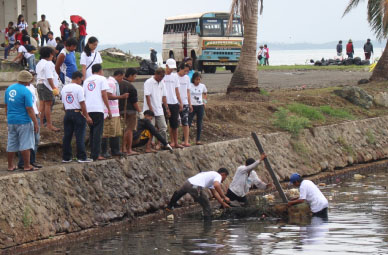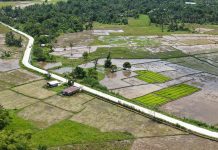
In celebration of World Water Day, Save the Children, together with local government units and humanitarian organizations, urges the public to act upon urgent water and sanitation issues in ‘Yolanda’-hit areas. Despite achievements in providing safe water, interventions aimed at improving access to toilets continues to lag behind, the water, sanitation and hygiene or ‘WASH’ cluster warns. This is the coordinating body responsible for addressing water and sanitation in typhoon-affected communities.
“Simply tackling the water system issue is like dressing a wound without removing the bullet; water systems are only part of the equation, the other part is sanitation.”, says Wayne Chang, Save the Children’s Infrastructure Consultant for the agency’s ‘Typhoon Yolanda’ response.
“Save the Children has done rapid assessments in over 100 barangays across seven municipalities in Leyte, and found that many communities are dependent on community-level water supply systems. In a place where more than 60 percent of the population do not have access to proper toilets, open defecation is common practice. As water pipelines are usually running downhill, they are very susceptible to contamination due to damaged pipe connections,” he added.
Improved access to toilets, along with solid waste and water resource management, is important to protect water sources, eliminate open defecation, and prevent the spread of diarrheal diseases and to protect the dignity of families. Save the Children recognizes, however, that repairing damaged pipelines and building toilets alone may not fully address water and sanitation problems. Without proper consultation with and full involvement of the community, these projects may not succeed in the long-term.
Save the Children is working closely with the local government, the Department of Health and humanitarian organizations in restoring water supply systems to provide clean water; engaging schools in hygiene promotion sessions and training communities in reconstructing their toilets.
As part of the World Water Day celebration and to raise awareness of these issues, Save the Children took part in the ‘Walk for Water’ Torch Parade and ‘Coastal Clean-Up’ in Tacloban. Some 500 volunteers joined the coastal clean-up near Tacloban City Astrodome.
Lorencio Lagarto, 50, one of the volunteers explained why he joined the activity: “I believe that it is crucial that everybody—all residents from different parts of the province along with the concerned organizations working here—work together to ensure the fast recovery of our typhoon-hit province.” (PR)



